T.I.P. is a technological institute that provides education and has a unit that engages with the private sector in developing new technologies. WDI is collaborating with T.I.P. to develop a strategic roadmap for commercializing technologies produced through funded research and special projects. The commercialization plan will guide researchers in their initiatives along technology transfer. A team of MBA students performed a market analysis of two technologies and began an overview of the commercialization process within T.I.P. A second team did a deep dive into programs and courses, then developed recommendations for how to improve the commercialization process.
WDI conducted market research for a company that designs and manufactures unmanned aerial vehicles (UAV) to transport small goods. Use of UAVs to transport items in low- and middle-income countries is low but they show significant potential for making healthcare commodities available in settings with poor infrastructure challenges. The purpose of WDI’s market research was to identify opportunities for this company’s expansion into both healthcare and non-healthcare sectors in Kenya, the Philippines, Zambia and non-healthcare sectors in Senegal. Data had been collected from decision-makers in public and private organizations in each country covering several topics such as product use cases, current transport activities and factors influencing the purchase or lease decision. Data was then analyzed and summarized into a go-to-market strategy for this UAV company in these four countries. This project was funded by the Bill & Melinda Gates Foundation.
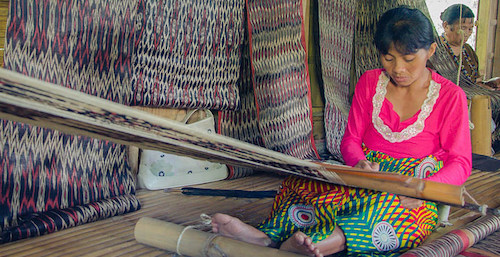

By Dan DeValve
The decision by small and medium enterprises (SMEs) in emerging economies to enter an international market is a key step in their maturation. For some SMEs, the move is necessary for survival in a competitive local economy, while for others it’s a logical next step for a successful and growing organization.
Kim Ian’s Dairy Delights is an excellent example of how a locally successful business in an emerging economy, in this case, the Philippines, approaches the decision to transition to the regional or international market. In 2015, I traveled to the Philippines and visited the town of Los Baños, home to many agribusinesses and located near the capital city of Manila. One of the town’s successful small businesses, Kim Ian’s Dairy Delights, had rapidly grown its production of goat milk-based cream cheese. It now faced a decision between scaling up the business to reach supermarket chains in Manila, or remaining in the much smaller niche market in Los Baños. The business owner recognized that expansion of the business would require reallocation of resources to pay for marketing and logistics, significant financial investment and risk, and a strategy for healthy growth of the company. Despite the risks, ultimately the namesake owner decided that their success hinged on a transition to the larger Manila market.
“Foreign market entry is considered as a key strategy to grow and survive over longer periods of time for SMEs,” according to a recent study on Bangladeshi SMEs in the International Marketing Review. In emerging economies with vibrant entrepreneurship sectors, such as the Philippines, the decisions made by these business leaders are instructive and can be illuminating for SMEs in other emerging economies.
While entering the export market has clear benefits, it is a major risk for a small business and can easily result in failure. As key factors of success, a recent study in the Journal of World Business stressed the importance of international business experience on the part of the SME owner, the strength of the home country’s institutional support for SMEs, and whether the SME is using the proper business model. If they have the advantage of institutional support, such as the local government or a business incubator, business owners can also utilize a “learning-by-exporting” model to make the transition, as highlighted in a previous NextBillion post.
A selection of three recent case studies published by WDI Publishing, part of the William Davidson Institute, highlights several issues commonly faced by Philippine SME owners as they consider a move to the international market. These three cases, which are available for free, were among a total of 94 published as part of a four-year project focused on training university faculty in the Philippines on how to teach and write business case studies. WDI implemented the project, in partnership with RTI International and the United States Agency for International Development (USAID).
A business case study is a documented analysis of a real-life business scenario, typically one in which the protagonist must make a crucial decision affecting the success of the business. As a teaching tool, cases provide students with “real-life” experience in decision-making and strategic thinking. As Philippine faculty engaged with a local business and identified a dilemma to feature in their cases, we noticed many focused on whether or not SMEs in the Philippines should enter international markets.
A common theme runs across these three cases. Each business is established in the domestic market with varying degrees of success, and each owner recognizes the advantages to be gained in exporting. Despite the potential benefits, the business owners must also consider the risks, especially adjusting an existing business model and scaling up production capacity to meet the demands of a new market.
Because the case studies were published in 2016 and 2017, WDI was able to review the various decisions ultimately made by these business owners and the ensuing results:
As this view inside three organizations showcases, SME owners can find it difficult to make the transition from domestic to international markets due to a lack of business experience. However, as illustrated in the cases of IPMC and REFMAD, government support for SMEs during this process is crucial. It can include assistance, such as the coordinating of trade fairs to help business owners make new connections, entrepreneurship training programs to provide business owners with the tools needed to scale a business, or even simple promotion of the business to potential customers.
As in the case of GFCP, if the business expertise, proper business model and ability to scale up production are absent, and the business has little to no external support, the idea of entering the international market remains only a dream.
Note: This article was written by Daniel DeValve, a senior project manager for grants management at WDI. The article originally appeared on NextBillion, which is managed by WDI.
Photo by I Travel Philippines via Flickr
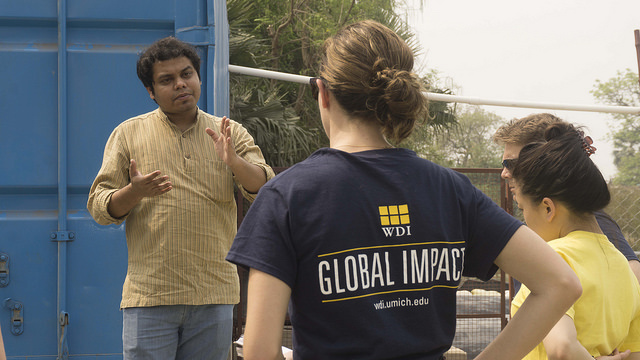
From a 2017 WDI-sponsored MAP team.
WDI’s partnership with Aravind Eye Care System dates back to 1999. Over the years, the organization has utilized a combination of student MBA teams and other engagements with the Institute to explore new ideas for growing strategically and improving operations at its hospitals and clinics, which offer world-class eye care at affordable prices.
Just a few of those completed projects include determining the appropriate governance structures for Aravind, consulting on expanding geographically and growing eye care services, implementing improved operational processes, delivering HR capabilities and leadership training for physicians, and improving the culture and patient experiences. Each of those projects were sponsored by WDI as part of the Ross School of Business’s annual Multidisciplinary Action Projects (MAP).
In 2016, a student team customized and tested an existing process model at select Aravind facilities that measured performance of each unit in terms that everyone in the organization could understand. Last year, the Aravind MAP team worked with senior leadership to develop a roadmap for the eyecare system’s future growth.
MAP is an action-based learning course offered at Ross in which MBA students receive guidance from faculty advisors. Each project requires analytical rigor, critical thinking, and teamwork. (Find out more about WDI’s MAP projects over the years here.)
After learning about their projects and conducting secondary research for several weeks, the students spend two to four weeks working with their organizations in the field.
In March, a MAP team (one of nine sponsored by WDI) will travel to Chennai, India to work at Aravind’s largest facility, which opened in September 2017 and offers the usual suite of services to patients, including specialty eye surgeries. As the new facility nears its six-month anniversary, administrators are studying patient care and looking for areas of improvement.
The students, as part of their overall work to enhance the patient experience, will work with Aravind leadership to develop recommendations on how to transition some of the work performed by eye specialists to general ophthalmologists, who are currently underutilized. Before heading to Chennai on March 17, the team will meet with faculty at the University of Michigan’s Kellogg Eye Center to hear how they manage similar issues.
Members of the MAP team said they are eager to observe the Aravind business model, which student Gerard Heath called “a leader around the world in developing solutions to provide high quality care in low-resource environments.” They all think the experience and work at Aravind will help them in the classroom as they finish up their studies, and may help inform their future career paths.
Kelsey Wyatt-Mair said she is interested in operations and “learning from this hands-on experience will equip me for later in my career, whether it’s in or out of healthcare.”
And Katie Zurales is “excited to see a different healthcare system” and how high quality, cost-effective healthcare “translates to different cultures.”
Of the four team members, which also includes Daniel Semaan, only Wyatt-Mair has some international work experience.
“It will be interesting for all of us – how to navigate that culture,” Wyatt-Mair said. “We’ll get exposed to the similarities and differences of Aravind with, say, Kellogg Eye Center.”
In between the work, the group plans to explore some local temples and beaches and perhaps travel to other cities. They said they were excited to discover Chennai was listed as one of the world’s best “food cities.”
WDI Initiatives often recruit partner organizations to work with MAP teams. The Aravind project is aligned with the Institute’s Healthcare Initiative. Similarly, WDI’s Education Initiative is working with the MAP team assigned to the Technological Institute of the Philippines (TIP) project. The students will create a strategic plan for a newer TIP initiative to improve the engineering and technology skills of students.
Amy Gillett, vice president of WDI’s Education Initiative, said MAP teams are one of the ways the initiative can improve the delivery of management education in emerging markets.
“The MAP teams bring new perspectives to universities in emerging markets,” she said. “They help university leadership think in different ways about how to expand into promising new areas or how to think strategically about growing an existing department or initiative. We’re so pleased to have this opportunity to unite MBA students – with their passion for social impact and their strategic thinking – with our university partners who welcome fresh insights.”
Like many of the Institute’s MAP partners, TIP has collaborated with WDI in the past. TIP was one of three university partners that worked with WDI on the STRIDE project.
“We’re so pleased to continue our successful partnership with TIP,” Gillett said. “During a recent trip to Manila, I had the opportunity to meet with TIP’s leadership. I was really impressed by their commitment to providing access to a college education for underserved communities as well as by their drive to continuously improve their operations and the services they offer to students.”
Here is a summary of each WDI-sponsored MAP project:
Aparajitha Foundations – India
Advisors: Paul Clyde, WDI and Ross School of Business; Stewart Thornhill, Zell Lurie Institute for Entrepreneurial Studies and Ross School of Business
MAP Team: Amirah Patterson, Riki Smolen, Robert Mack, Nathan Stevens
Aparajitha Foundations is a charitable trust that supports the less privileged, mainly in the areas of education and health.
The team will co-create alongside the founding team of the Michigan Academy for the Development of Entrepreneurs (MADE) as they test, validate, and iterate on MADE’s business model and product prototype for supporting entrepreneurs and Small Medium Enterprises (SMEs) in Madurai, India. MADE is a nonprofit institute established at the Ross School of Business by the Zell Lurie Institute for Entrepreneurial Studies, in partnership with WDI and Aparajitha Foundations, that works with entrepreneurship development organizations in developing countries to give individuals operating businesses in these environments the knowledge and best practices they need to thrive.
Aravind Eye Care System – India
Advisors: Paul Clyde, WDI and Ross School of Business; Jim Walsh, Ross School of Business
MAP Team: Gerard Heath, Katie Zurales, Daniel Semaan, Kelsey Wyatt-Mair
Aravind Eye Care System is a vast network of hospitals, clinics, community outreach efforts, factories, and research and training institutes in south India that has treated more than 32 million patients and has performed 4 million surgeries since its 1976 founding.
The MAP team will develop a framework for integrated patient care service delivery.
CURE International – Ethiopia
Advisors: Paul Clyde, WDI and Ross School of Business
MAP Team: Simon Kaufmann, Keegan McQuillan, Alan Wisniewski, Brandon Yelen
CURE operates clubfoot clinics in 17 countries around the world, each tasked with helping children and families deal with the congenital deformity that twists the foot, making it difficult or impossible to walk. In Ethiopia, CURE manages 37 clinics.
The MAP team will work to improve quality and increase scale of leg brace production in Ethiopia.
Ghana Emergency Medicine Collaborative – Ghana
Advisors: David Butz, WDI and Ross School of Business; Jim Walsh, Ross School of Business
MAP Team: Alexander Ukoh, Liam Kraft, Kartik Raju, Shreyance Mandaliya
The Ghana Emergency Medicine Collaborative aims to improve emergency medical care in Ghana through innovative and sustainable training programs for physician, nursing and medical students. The goal of the training programs is to increase the number of qualified emergency health care workers retained over time in areas where they are most needed.
The student team will investigate the feasibility of incorporating mobile payments into the emergency department workflow, including an analysis of how that will impact both the finances and operations of the department.
Imperial Logistics – South Africa
Advisors: David Butz, WDI and Ross School of Business; Ravi Anupindi, Ross School of Business
MAP Team: Justin Loescher, Jasmine Knowles, Courtney Alexander, Javier Castillo
Imperial Logistics provides logistics and supply-chain management across the African continent, and is a leading distributor of medicines and healthcare products.
The MAP team will establish an African Pharmaceutical Wholesaler Association (APWA).
Outbound Initiative – Brazil
Advisors: Paul Clyde, WDI and Ross School of Business; Stewart Thornhill, Zell Lurie Institute for Entrepreneurial Studies and Ross School of Business
MAP Team: Tsering Sherpa, Daniel Vergara Ramirez, Dale Jarosz, Varun Haralalka, Agustin Sosa, Mike Porcelli
Outbound Brasil uses the latest technology to identify global opportunities and resources for the growth of innovative and high impact business in that country, such as new and better markets, customers, partnerships, investments and awards.
The team will conduct a situation analysis on the Brazilian tech investment scenario and make recommendations for which innovations could make smart money more accessible to local startups.
REFRESCH – Gabon
Advisors: Paul Clyde, WDI and Ross School of Business; Bob Dittmar, Ross School of Business
MAP Team: Alena Golovchenko, Felipe Prieto Nunez, Sean Welsh, Allie Murphy
REFRESCH (Researching Fresh Solutions to the Energy/Water/Food Challenge in Resource Constrained Environments), is a consortium of educators and researchers working to improve the lives of those living in resource-constrained communities. Its goal is to find solutions to challenges in the areas of food, water and energy. It is funded by the University of Michigan Third Century Initiative and is headquartered at the University of Michigan Energy Institute.
The student team will identify a set of commercially viable business model archetypes or templates to increase access to renewable energy products and services in Gabon. They also will develop a recommendation on the most likely template to be profitable. A secondary goal is to understand the entrepreneurial skills and capabilities required to launch and operate such enterprises.
Technological Institute of the Philippines (TIP) – Philippines
Advisor: Paul Clyde, WDI and Ross School of Business
MAP Team: Joseph Grandominico, James Schoen, Alexa Thomas, Charlton Washington.
The Technological Institute of the Philippines (T.I.P.) is a leading private tertiary education institution that specializes in engineering and technology courses, and has an enrollment of 25,000 students on campuses in Manila and Quezon City. In 2016, the school launched T.I.P. TechnoCoRe, which aims to develop engineering and technology students’ skills in problem-business opportunity formulation, ideation, validation and execution – the core skills of technopreneurship.
The student team will create a strategic plan for T.I.P. TechnoCoRe.
Vayu Inc – Senegal
Advisor: Paul Clyde, WDI and Ross School of Business
MAP Team: Alexander Franczyk, Brandon Pickett, Adam Ronk, Adam Woodruff.
Vayu has developed an unmanned aerial vehicle (UAV) that can be used to deliver needed medical supplies and products to remote areas. The UAV launches and lands like a helicopter and flies like an airplane once off the ground. It can fly 100 kilometers and hold just over two kilograms of payload.
The team will conduct market analysis and develop an entry strategy for introducing delivery UAVs into Senegal’s market.
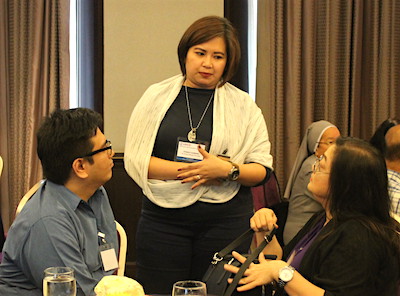
In collaboration with key partners, WDI last month organized a conference in the Philippines that brought together university career service professionals and industry partners to share experiences, progress and best practices for moving graduates from the classroom to the workplace.
The two-day conference in Manila attracted more than 50 people from around the island nation and was part of the Science, Technology, Research and Innovation for Development (STRIDE) program funded by USAID and implementing partner RTI International. For the last three years, WDI has provided technical support for three Philippine university career centers as they work to strengthen relationships with business and industry. The March conference was a forum for career center directors and staff from those three partner universities and others to present what they’ve learned to their peers from across the country.
Filipinos in both academia and in private enterprise recognize the gap that exists between the skills employers expect from recent graduates and the skills universities are providing. Career centers can bridge that gap by equipping students with critical thinking, teamwork, and communications skills – qualities employers seek.
“Forging a stronger connection between industry and academe in the Philippines will result in higher employment, more productivity, and a more globally competitive workforce,” said Amy Gillett, vice president of WDI’s Education Initiative, who helped manage the conference. “This event showed there is significant interest in forming a Filipino network linking colleges and employers. Participants understood they can start it in small ways, through simple steps like meeting over coffee to flesh out more details or starting a Facebook group.”
The conference included four best practice sharing sessions, including three from universities supported by WDI and its consultants. WDI collaborated with the University of Santo Tomas (UST), the Technological Institute of the Philippines (TIP), and the University of Iloilo (UI) by matching the institutions with career center experts based in the United States. WDI and its partners worked to address the priorities identified by each career center. Activities included virtual and in-person support as well as other learning activities over the course of the three-year engagement.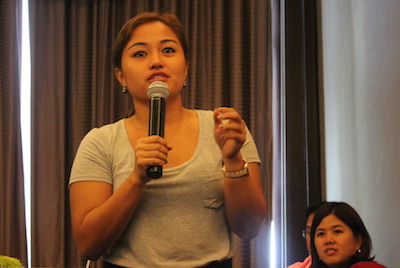
Leaders from the universities presented how they have made significant progress to meet their goals over the past three years and have begun to share lessons learned with other universities as well. In their presentation, representatives from TIP focused on three key areas: providing employment readiness, which involves both preparing students and incorporating feedback from businesses; involving the greater campus community in supporting the career services center; and, focusing on students’ long-term career success.
“Students must be prepared inside and outside the classroom,” said TIP President Elizabeth Quirino-Lahoz. “We need to eliminate the gap between industry expectations and the kind of students schools produce.”
Frank Alejandrino, director of Career Services Director at TIP, mentioned that to-date, 30 universities throughout the Philippines have visited the TIP career center to learn from their practices. “Our doors are open,” he said.
Lucila Bance, head of Career Services at UST, presented the school’s new program: GUTS – Gear Up Tools for Success – a series of career workshops with themes targeting career readiness. Bance also highlighted the fact that the UST modules are delivered to students by partner companies who provide career-related seminars on a variety of subjects including networking and professionalism.
Following a recommendation by WDI consultants, representatives from UI said they have started inviting industry experts to teach for a semester and have seen strong results.
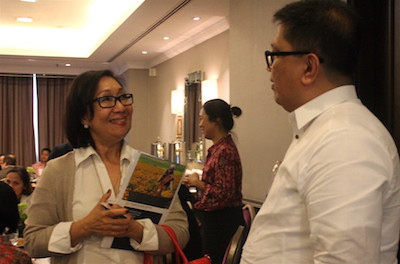 Several participants inquired about building a new professional association in the Philippines. WDI Consultant Andrew Ceperley introduced the idea of a network that would link academia and industry, similar to the U.S.-based National Association of Colleges and Employers (NACE). Participants discussed how such a network might take shape in the Philippines and the industry representatives at the forum contributed to the discussion by highlighting what services and competencies they value in a career center.
Several participants inquired about building a new professional association in the Philippines. WDI Consultant Andrew Ceperley introduced the idea of a network that would link academia and industry, similar to the U.S.-based National Association of Colleges and Employers (NACE). Participants discussed how such a network might take shape in the Philippines and the industry representatives at the forum contributed to the discussion by highlighting what services and competencies they value in a career center.
Farouk Dey, WDI consultant and head of Career Services at Stanford University, led a session that explored several trends for career services. Today’s career services field is all about “connections and community,” he said. Dey suggested career services professionals engage alumni as well as employers, and to get out of the office to better engage with students around the campus community.
Several participants came away inspired and ready to take action at their universities.
“We don’t have funds, but having these ideas will allow me to make small steps. I’m feeling pumped up and ready to make recommendations to my management,” said Horacio Gutierrez, Philippine Women’s University.
El Anelio Barnachea, of De La Salle – College of St. Benilde, added: “This conference was an opportunity for me to understand the industry and academic linkages. Students have problems in terms of career decisions. Now I have a wider perspective on how to match students’ needs with industry demands. It was also important that industry was at this conference so we could hear what kind of competencies they need.”
Please click here to learn more about WDI’s work through the STRIDE program.
Cultural factors can influence just about every aspect of an entrepreneur’s journey: from how they seek funding, to how they deal with setbacks, to how aggressively they grow. We compared our countries, the USA and the Philippines, to explore how cultural background influences entrepreneurs.
WDI is debuting the first of an ongoing series detailing the long-term impact the work the Institute is having in a certain sector or a particular geography.
The first WDI Impact Report, “Improving Business Education in the Philippines,” examines the Institute’s contributions to the five-year STRIDE project that is focused on strengthening the science, technology, research and innovation capacity on the island nation.
In 2013 the United States Agency for International Development (USAID) launched the Science, Technology, Research and Innovation for Development (STRIDE) program in the Philippines through its implementing partner RTI International. As part of the STRIDE project, WDI was asked to provide academic support for faculty from dozens of Philippine universities. WDI designed and delivered four workshops to teach over 130 professors how to write and teach business case studies while also helping faculty increase engagement with local industries and companies.
WDI assisted the professors as they developed and wrote their case studies. WDI then published the business cases on its WDI Publishing site. There are more than 90 case studies that are part of the WDI Philippines Case Collection.
“Case studies give a wider and deeper perspective into the featured organizations,” said Manuel Manuel III of the University of the Philippines Diliman, who attended the first case writing workshop. “In my case, it has given me an appreciation of the challenges the company is facing and/or has faced and what it is doing moving forward.”
WDI President Paul Clyde said the STRIDE program serves as an excellent model for integrating the work of academics with the private sector – making it a strong project to showcase as the Institute’s first Impact Report.
This WDI Impact Report, entitled “Improving Business Education in the Philippines,” examines the Institute’s contributions to the five-year STRIDE project which was focused on strengthening the science, technology, research and innovation capacity on the island nation. In 2013 the United States Agency for International Development (USAID) launched the Science, Technology, Research and Innovation for Development (STRIDE) program in the Philippines through its implementing partner RTI International. As part of the STRIDE project, WDI was asked to provide academic support for faculty from dozens of Philippine universities. WDI designed and delivered four workshops to teach over 130 professors how to write and teach business case studies while also helping faculty increase engagement with local industries and companies.
Despite positive trends, entrepreneurship in the Philippines faces challenges – especially within entrepreneurship education. To respond, WDI has successfully employed the case method to address gaps and set up Filipino entrepreneurs to succeed in their local context. This article demonstrates how by showcasing several Philippine cases published by WDI Case Publishing as part of the USAID/Philippines STRIDE project.
Kristin Babbie, a senior project administrator at WDI’s Grants Management team, recently attended the Global Youth Economic Opportunities Summit and authored the following post for NextBillion.net. NextBillion, a WDI affiliated site, originally published the article on Oct. 12, 2016.
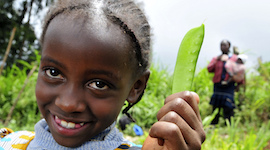
In 2013, I interviewed a group of young people at a youth empowerment center in Kenya about their perceptions of agriculture as a livelihood. The interviews were part of a study driven by concerns about Kenya’s youth bulge, coupled with anecdotal evidence that the country’s youth had negative attitudes about working in the agricultural sector. The attitudes of the youth I interviewed were shaped primarily by the significant barriers they faced in accessing the capital needed to develop agriculture-based enterprises. Indeed, my findings pointed to the conclusion that the youth and agriculture problem runs deeper than the “youth are not interested” narrative.
Fast forward to 2016 and the Global Youth Economic Opportunities Summit hosted by Making Cents International, where the youth and agriculture problem was highlighted and the simplified assumptions underpinning it – such as “youth just are not interested” – were challenged.
So why is the youth and agriculture problem a concern to international development practitioners?
For one, agriculture is the “backbone” of many sub-Saharan countries. For instance, agriculture accounts for about 70 percent of the total labor force and 30 percent of Gross Domestic Product in Kenya. Second, rural households in Kenya rely heavily on subsistence agriculture for food consumption. And third, the country’s labor market lacks the ability to meet the demand of young job seekers. The highest unemployment rates in Kenya are for 20-year-olds, at 35 percent, followed by 25-year-olds, at 25 percent.
At the Global Youth Economic Opportunities Summit’s plenary titled “Seeding the Future: Land Tenure, Technology, and Opportunities in the Rural Economy,” panelist Thomas Jayne, a professor in the Department of Agricultural, Food and Resource Economics at Michigan State University, emphasized that agriculture is not a “declining sector” in sub-Saharan Africa. Over the next 20 years in sub-Saharan Africa, he said 350 million youth will pursue employment, but even under the most favorable conditions only 25 percent will find wage-paying jobs in the formal economy. Agriculture offers a potential solution.
USAID’s Feed the Future Initiative cites the World Bank’s “Agriculture for Development” report, which makes the investment case for agriculture in developing countries. Perhaps the most compelling finding is that for people with the lowest incomes, “GDP growth originating in agriculture is about four times more effective in reducing poverty than GDP growth originating outside the sector.” Jayne presented the argument that multiplier effects offer the most significant benefit for investments in agriculture. Given the sheer size of the agricultural sector in sub-Saharan Africa in terms of number of producers, a slight increase in per capita income would have an overall positive economic impact.
“Since 2013, farmers’ sales of Feed the Future-supported crops increased 30 percent, on average. For poor farming families, this means more income to: buy more food, access healthcare, pay for school, save for & invest in the future. Economic empowerment is good for rural families, their communities and countries, and the world. It all adds up.”
Ending Hunger and Poverty: A Snapshot of Progress
Following Jayne’s talk, Odenda Lumumba, CEO of the Kenya Land Alliance, described a rural-to-urban migration trend he has observed in Kenya. Young people move to urban areas to attend school, he said, and once they are there, it is not uncommon for them to move to slums due to lack of opportunities. He implied that in many cases greater opportunity awaits youth in rural areas than in urban areas. The World Bank’s Agriculture for Development report points out that while agriculture is a driver of sub-Saharan African economies, only 4 percent of public spending is allocated to the sector. Lumumba called on governments, donors and the private sector to invest in agriculture where it can have a significant multiplier effect: “Today agriculture has the biggest opportunity to end hunger and eventually end poverty. But how do you do that? That is the challenge.”
Prior to the plenary, Beth Dunford, assistant to the administrator in USAID’s Bureau for Food Security, said that it is not that youth in sub-Saharan Africa are simply not interested in agriculture; it is that they are not interested in pursuing the agriculture of their parents. Dunford said, “Young people bring the kind of innovation, energy and enthusiasm that we need to tap into (for) transformative solutions to many of our biggest problems. Youth are interested in that, and that is what we need for agriculture.” Her message resonated with the research I did in 2013, in which youth frequently reflected on their experiences witnessing their parents’ hard manual labor. Dunford described Feed the Future’s approach to development, focused on creating enabling environments with youth – not for youth – to grow and expand their agricultural enterprises. A key takeaway message was that “there is money in the soil,” an expression Dunford heard while in Zambia.
The panel included two youth who both provided on-the-ground perspectives of how they had pursued agriculture in their home countries of Tanzania and the Philippines. First, 22-year-old Sirjeff Dennis of Jefran Agrifriend Solutions (JAS), based in Tanzania, shared his experience of growing up in a slum where finding a meal was difficult. When he saw a woman in his neighborhood lose her baby to malnutrition, it gave him the passion to end hunger through agriculture. Despite earning his degree in petroleum engineering, Dennis decided to become an agricultural entrepreneur, or “agripreneur.” Five years ago he started his company with $50 USD. He purchased 50 chickens and eventually expanded his enterprise to include maize, rice, tomatoes, Chinese cabbage, okra, eggplant and onion. On one hand, he explained, there is a common stereotype among Tanzanian youth that agriculture is something that should be done by poor people with a low level of education; on the other hand, people throughout his country really love it.
Dennis’ comments suggest that there is a cultural value to agriculture; however, there is a perception that those who pursue careers in the sector are minimally educated and are destined to be poor due to the difficulty in generating sustained incomes. To assist in debunking this attitude, Dennis created a youth and agriculture initiative within JAS, recruiting and training young people to start their own agricultural enterprises. He had hoped for 30 applicants but received 300, demonstrating the interest of youth in agriculture.
Today, Dennis’ business employs 37 people, with 80 percent of them 23 or younger – and 20 percent are women. Despite the success, he points to key challenges that threaten the sustainability of his enterprise. For one, access to finance is a significant problem for Dennis. For example, despite the exposure he gained through winning a MasterCard Foundation award, the local bank was still not willing to provide him with a loan. The reason? Because he is 22 and doing agriculture. Another challenge, he said, is access to equipment. He had to import equipment through Alibaba, an online marketplace, to scale his business, which was very expensive. Dennis recommended that the government in his country lower taxes for young farmers, provide assistance to youth to form farming cooperatives, and provide financial assistance. He stated that development practitioners must create awareness among banks and governments about the unique challenges agri-preneurs face, so that investments in agriculture make sense.
Another young agri-preneur, Cherrie Atilano, shared her perspective as it relates to a social enterprise she founded called AGREA, based on the island of Marinduque in the Philippines. AGREA leads a youth movement in support of agriculture, offers a variety of trainings and events, promotes sustainable agricultural technologies, and bridges the gap between farmers and consumers. AGREA is known for its tagline, “Making farming cool, smart, sexy, and humane.” Atilano starting farming when she was 12 years old and 18 years later, she is still involved. She said a lot of young people in the Philippines, especially professionals, are going back into the sector. There are thriving high-value markets for organic and artisan foods in Southeast Asia, she said, and the Filipino government has begun to recognize the value of agriculture. For example, a new law mandates all public and private schools visit a farm once per year as a field trip. Finance, Cherrie noted, remains the most significant barrier to young farmers working to start their own agricultural enterprises in her country.
Speakers at the summit made a strong argument for the potential of agriculture and why the development community should continue to challenge the assumptions behind the notion that youth are not interested in it. However, the transformation of structures (including government and the private sector) and processes (such as laws, policies, culture and institutions), which in turn influence ability to respond to shocks, trends and seasonality, must be addressed within the local context. These macro factors have an ultimate influence on the ability of youth to access key capital to develop, sustain and scale their agri-enterprises.
Photo by Neil Palmer (CIAT) via Flickr